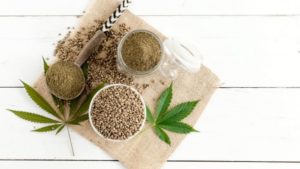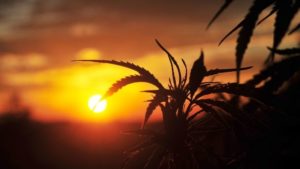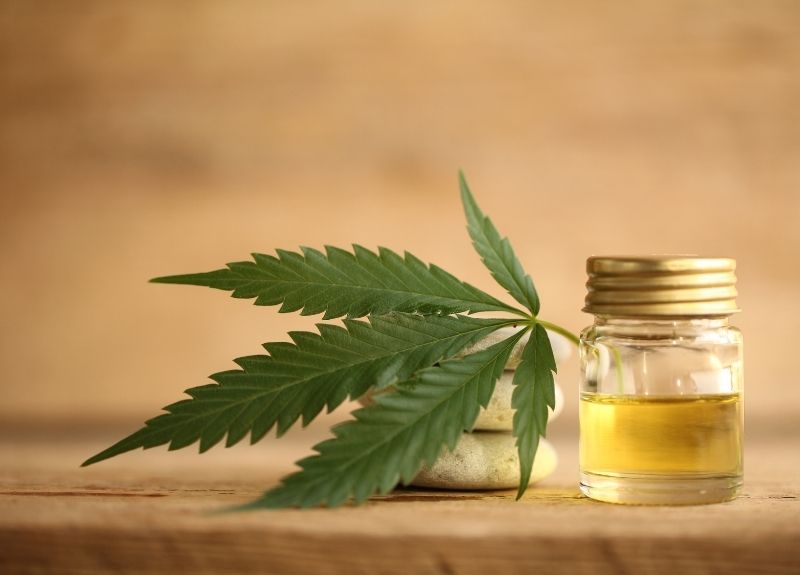Cannabis is becoming a mainstream wellness trend and it’s only getting more popular. What was once associated with bongs and reggae music is now making waves in the realm of natural medicine. Cannabis has been shown to alleviate symptoms of numerous mental and physical health issues.
In fact, the U.S. Food and Drug Administration (FDA) approved cannabidiol (CBD) medication to treat rare types of epilepsy. Despite its increasing popularity, there are complex concepts and jargon surrounding cannabis wellness that can be difficult to understand.
One common question we hear is: “Is CBD oil the same as weed?” This question basically means: “Will CBD oil get me high?” The short answer is “no.” CBD doesn’t contain psychoactive components, which speaks to its wide appeal. Let’s take a deeper look into the specifics of CBD oil, cannabinoids, and marijuana.
 Recreational vs. Medical Cannabis: Difference Between CBD Oil and Smoking Weed
Recreational vs. Medical Cannabis: Difference Between CBD Oil and Smoking Weed
CBD oil is a non-psychoactive herbal remedy that is taken orally. It can come in a variety of products, including tinctures, capsules, edibles, and vape oils. Generally, CBD oil is intended for medical use because it comes in smaller doses and contains low-to-little tetrahydrocannabinol (THC).
CBD oil is ideal for those who don’t want to feel high but reap the therapeutic benefits of cannabis.
Where Does CBD Oil Come From?
CBD oil is created by extracting CBD from a hemp or marijuana plant. Common extraction processes include:
- Oil extraction (using olive oil)
- CO2 extraction
- Solvent extraction (using alcohol)
CBD oil is commonly derived from hemp, which contains less than 0.3% THC. However, there are some full-spectrum, or “whole plant,” CBD oils that contain higher amounts of THC. Some consumers may wish to have an oil that is a mixture of CBD and THC to compound the effects.
 How Popular Is CBD Oil?
How Popular Is CBD Oil?
Here’s a snapshot of how U.S. adults view CBD:
- 64% are familiar with CBD
- 33% have consumed CBD at least once
- 40% of individuals aged 18-29 have tried CBD at least once, followed by 32% aged 30-44, 23% aged 45-59, and 15% aged 60 and older
- 22% of CBD users say it helps them replace or supplement over-the-counter or prescription drugs
- 40% of CBD users purchase it from a dispensary; 34% from a retail store; 27% from an online retailer
The U.S. CBD market was valued at $4 billion in 2019 and is set to reach $25 billion by 2025. Most CBD consumers report using it for pain, anxiety, inflammation, and insomnia.
What Is Cannabis?
Cannabis is an umbrella term for all species of the cannabis plant, which includes hemp and marijuana. Many CBD companies and doctors prefer to use the term “cannabis” instead of weed or pot.
However, it can be confusing to know whether someone is referring to marijuana or hemp when using the term cannabis. There are key distinctions between these two plants. Keep reading to find out the differences between hemp and marijuana.
What Is Marijuana?
Marijuana is the common term used to describe the cannabis Sativa species. Generally, marijuana has a high THC content and low CBD content. Marijuana has been the subject of stigma and law enforcement crackdowns for decades in the U.S.
Despite the negative attitudes surrounding marijuana, there are numerous potential therapeutic benefits of the drug. See the “medical benefits” section below for more insight.
 What Is Hemp?
What Is Hemp?
Hemp plants have high concentrations of CBD and less than 0.3% THC. A lot of CBD oil on the market derives from hemp plants, but keep in mind that CBD oil is different from hemp seed oil.
When shopping for CBD, you may find hemp seed oil labeled similarly to CBD oil. The key difference is hemp seed oil contains barely CBD and is used for nutritional and culinary purposes. While hemp seeds do not contain cannabinoids, they do contain vitamins, minerals, and fatty acids.
What Are Cannabinoids?
If you wish to fully understand the benefits of cannabis products, it’s vital to understand the chemical compounds in the plant. There are more than 100 known cannabinoids besides CBD and THC, including:
- Cannabigerol (CBG)
- Cannabichromene (CBC)
- Cannabinol (CBN)
- Tetrahydrocannabinolic acid (THCA)
Several of these lesser-known cannabinoids are becoming more popular in wellness supplements. For example, you can now find CBN oil instead of just CBD oil. As we learn more about these cannabinoids, their availability in supplements will only increase.
What Is the Endocannabinoid System?
Cannabinoids interact with the human body’s endocannabinoid system. The endocannabinoid system is comprised of receptors and neurotransmitters that regulate important functions, such as cognition, digestion, and pain sensation. Think of endocannabinoids as cannabinoids that your body naturally produces. Your body utilizes endocannabinoids every day to maintain homeostasis.
Cannabinoids mimic these naturally-occurring compounds to provide certain effects. For example, one of the most well-known endocannabinoids is anandamide. Anandamide is known as the “bliss” molecule, responsible for feelings of happiness and motivation. Your body creates anandamide on-demand. When the anandamide is no longer necessary, enzymes come in to break it down.
Anandamide binds to your body’s CB1 and CB2 receptors. Interestingly enough, so does THC. THC mimics anandamide and provides feelings of euphoria. However, your body’s enzymes have a more difficult time breaking down THC. This is why the “high” feeling of consuming THC may last for several hours. When you consume THC, you are essentially overloading your endocannabinoid receptors with the bliss molecule.
 What Are the Differences Between THC vs. CBD?
What Are the Differences Between THC vs. CBD?
Both of these compounds influence the endocannabinoid system, but they have distinct effects.
Psychoactivity
Despite the fact that CBD and THC have a similar chemical structure, they don’t have the same intoxicating effects. When you consume THC, you may feel a sense of euphoria. CBD, on the other hand, does not provide any “high” feeling. In fact, CBD can even offset the unwanted effects of THC.
Legality
Laws regarding cannabis are evolving on a frequent basis in the U.S. CBD products that come from hemp plants with less than 0.3% THC are legal in all states. This means you can find hemp-derived CBD oil online and have it shipped.
However, products deriving from marijuana that contain more THC are only legal in a handful of states. Some states only allow medical marijuana, while others permit it for recreational use.
Medical Benefits
What are the benefits of CBD oil? Research shows that CBD can be useful for the following conditions:
- Seizures
- Pain
- Inflammatory bowel disease
- Anxiety
- Depression
- Psychosis
- Migraines
Some potential medical uses of THC include:
- Muscle spasms
- Pain
- Insomnia
- Glaucoma
- Nausea
- Low appetite
More research is necessary to fully understand the therapeutic benefits of CBD oil and THC.
 Safety and Side Effects
Safety and Side Effects
Some CBD side effects include fatigue, dizziness, and diarrhea. Common THC side effects include dry mouth, increased heart rate, memory loss, coordination problems, and slower reaction times. However, both CBD and THC are generally safe without notable adverse side effects.
Drug Testing
If you are subject to drug testing because of your job or as part of a legal proceeding, you may be curious whether CBD or THC will cause you to fail. THC is likely to show up in standard drug tests. CBD may also show up, although it is not detectable by every test. Even if you consume a hemp-derived product, there may be tiny amounts of THC that cause you to fail a drug test.
Curious about the benefits of CBD oil? Learn more about CBD on our blog.





No Comments